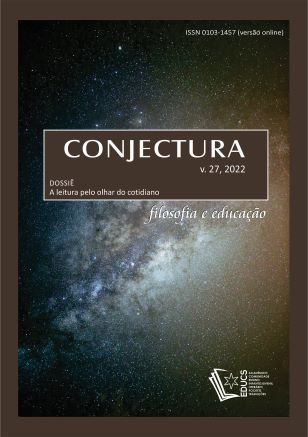Literary reading as social practice in contemporaneity: beyond school space
DOI:
https://doi.org/10.18226/21784612.v27.e022006Keywords:
BNCC, Readings Clubs, Contemporary Readings, Literature, Public Readings Policies.Abstract
This article arises from the dialogue between three researchers who have dedicated an expressive part of their academic careers to look at the practice of reading, especially literary as a possibility for more critical personal and social participation. However, in a country where books are still expensive and most people do not have the purchasing power to buy them, it is undeniable that the discontinuity of public reading policies comes in the process contrary to the formation of literary readers. Furthermore, this break, as it will be presented in the body of the article, delays the achievements that were achieved in short steps in our country, especially in the late 20th century and the beginning of the 21st century. Thus, it is important to look at the suspension of important public reading policies and those that are being engineered in contemporary times, since we are living in a moment opposite to that shown by the historicity of literary reading, because with the loss of literature in official documents, as, for example, there is no specific component in the National Common Curricular Base – BNCC, and the non-mandatory nature of literature as a discipline. On the other hand, there is an unschooled movement being disseminated by friends, publishers, book clubs and libraries – known as the reading clubs which, despite not being a recent practice, have gained expression in the last six years in terms of Brazil and has been strengthening in the social moment we are going through as a result of the pandemic.
References
BRASIL. Secretaria de Educação Fundamental. Parâmetros curriculares nacionais: língua portuguesa. Brasília, 1997.
BRASIL. Ministério da Cultural – Fundação Biblioteca Nacional – Programa Nacional de Incentivo a Leitura. PROLER: Concepções e Diretrizes. Rio de Janeiro, 2009.
BRASIL. Ministério da Educação. Base Nacional Comum Curricular. Brasília, 2017.
BORTOLIN, Sueli; SANTOS, Zineide Pereira dos. Clube da Leitura na Biblioteca Escolar: manual de instruc?o?es. Informac?a?o Profissa?o, Londrina, v. 3, n. 1/2, p. 147 - 172, jan./dez. 2014. Disponi?vel em: <http://www.uel.br/revistas/uel/index.php/infoprof/article/view/21012/pdf_21>. Acesso em: 28 jan. 2017.
CHARTIER, R. A aventura do livro: do leitor ao navegador. Trad. Reginaldo de Moraes. Sa?o Paulo: Editora UNESP/ Imprensa Oficial do Estado, 1999.
CORTÉS, Juan A. Núñez. Club de lectura: uma oportunidade para elaprendizaje permanente. In: GONÇALVEZ, Adair Vieira; PINHEIRO, Alexandra Santos (Org.). Leitura e escrita na América Latina: teoria e práticas de letramento. Dourados: Ed. UFGD, 2011.
FERNANDES, C. R. D.. Leitura literária na escola. In: III Congresso Latino-Americano de Compreensão Leitora - III COMLEI, 2010, Brasília. III Congresso Latino-Americano de Compreensão Leitora: ler para produzir mais cultura. Brasília: UnB, 2010. p. 42-42
LARROSA, Jorge. Pedagogia Profana: danças, piruetas e mascaradas. Belo Horizonte: Autêntica Editora, 2017.
MARIA, Luzia de. O clube do livro – ser leitor: que diferença faz? São Paulo: Global, 2016.
OLIVEIRA-IGUMA; ARTEMAN, Andreína Louveira de Mello. A leitura literária como direito no ensino fundamental I: reflexões teóricas e In: Mediação de Leitura Literária e Formação de Leitores: no Ensino Fundamental. São Paulo: Paco Editorial (no prelo).
PNLL: textos e história / José Castilho Marques Neto(org.). - São Paulo: Cultura Acadêmica
Editora, 2010. 340p.
PETIT, Michèle. A arte de ler ou como resistir à adversidade. Trad. Arthur Bueno e Camila Boldrini - São Paulo: Editora 34, 2010.
PETIT, Michèle. Leituras: do espaço íntimo ao espaço público. Trad. Celina Olga de Souza - São Paulo: Editora 34, 2013.
Downloads
Published
How to Cite
Issue
Section
License
1. The publication of the originals will imply the assignment of copyright to Conjectura Journal.
2. Texts cannot be reproduced without authorization from the Journal after acceptance.









